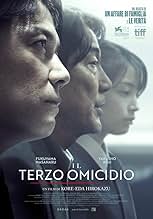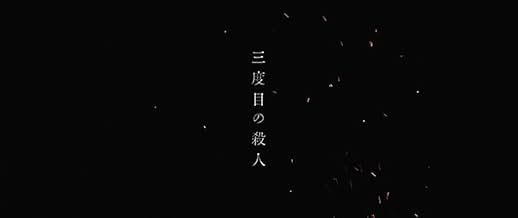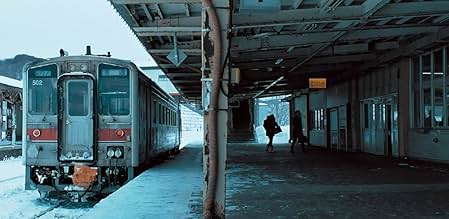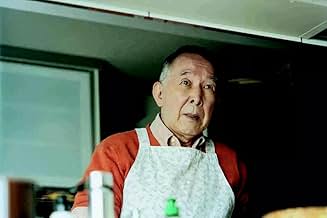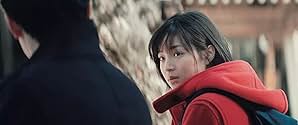NOTE IMDb
6,7/10
8,7 k
MA NOTE
Drame dans une salle d'audience, centré sur le meurtre d'un directeur d'usine.Drame dans une salle d'audience, centré sur le meurtre d'un directeur d'usine.Drame dans une salle d'audience, centré sur le meurtre d'un directeur d'usine.
- Réalisation
- Scénario
- Casting principal
- Récompenses
- 6 victoires et 17 nominations au total
Avis à la une
In recent years, Hirokazu Koreeda has been among the most exciting and interesting Japanese filmmakers. In movies such as "Like Father, Like Son", "Our Little Sister" and "Shoplifters", he tells marvelous stories about seemingly ordinary and non-cimematic sitations....stories about real people and about problems which you rarely hear about in Japanese movies. Here, in a bit of a change of pace, Koreeda takes on a story about murder....and it's complex, strange and ultimately worth seeing. Sadly, however, the pacing is glacially slow...and many viewers ultimately might give up on the film before its conclusion.
The story is about a group of lawyers who have been a pretty hopeless case to defend. It seems a man has pled guilty to murder and burning a corpse...and he's done little to help himself avoid the death penalty. In addition, his story is very inconsistent and keeps changing. Inexplicably, instead of just going through the motions as most lawyers would do in a case like this, Shigemori keeps digging to learn exactly what did happen and why...and, not surprisingly, it's not what the case originally seemed to be.
The story is slow....very, very slow. For non-Japanese audiences, this slowness makes watching the film with subtitles a bit tough...and I found myself drifting off on occasion. My advice is to stick with it....the twist is shocking and exposes some issues rarely addressed in films...especially Japanese films. Not surprising, as Koreeda seems to enjoy addressing topics which other Japanese filmmakers avoid.
The story is about a group of lawyers who have been a pretty hopeless case to defend. It seems a man has pled guilty to murder and burning a corpse...and he's done little to help himself avoid the death penalty. In addition, his story is very inconsistent and keeps changing. Inexplicably, instead of just going through the motions as most lawyers would do in a case like this, Shigemori keeps digging to learn exactly what did happen and why...and, not surprisingly, it's not what the case originally seemed to be.
The story is slow....very, very slow. For non-Japanese audiences, this slowness makes watching the film with subtitles a bit tough...and I found myself drifting off on occasion. My advice is to stick with it....the twist is shocking and exposes some issues rarely addressed in films...especially Japanese films. Not surprising, as Koreeda seems to enjoy addressing topics which other Japanese filmmakers avoid.
One of the most psychologically and thematically complex autopsies of truth, ethics, and morality I've seen. It reminds me of Rashomon in some respects, except that much of the fluidity and subjectivity of truth in this movie is found within a single character, and within societal systems of "truth-seeking," i.e., the "justice" and legal systems. Even the camera movement in this film is perfectly attuned to those themes, subtly moving into, over, and out of scenes from all directions. Koji Yakusho is superb as usual, and all other acting and casting is excellent as well, as is the score and the editing. I will be thinking on this one for a while.
The defense attorney Shigemori (Masaharu Fukuyama) is summoned to help his coworkers in a murder case. The prisoner Misumi (Kôji Yakusho) has confessed the murder of his former boss and factory owner that was burnt to ashes nearby a river to rob his wallet to pay debts in gambling. Misumi will face death penalty since thirty years ago he killed another man and was defended by Shigemori´s father. Shigemori´s purpose is to change the sentence from death penalty to life. Shigemori is not satisfied with the lack of evidences of the case and notes that Misumi changes his testimony in each interview. He decides to investigate deeper the case and questions the true motive for the murder.
"Sandome no satsujin", a.k.a. "The Third Murder", is a tribunal and fatherhood drama with a screenplay with many twists. The storyline is based on a murder case with a confessing defendant and his new attorney seeking evidences to learn the truth. In common, there is the fatherhood: Shigemori is an absent father due to his dedication to his profession. Misumi is also an absent father since he has spent his last thirty years imprisoned. The victim was an abusive father and Misumi connects to his daughter as a second chance in life. In the end, was the murder to pay a debt with the Yakuza or a righteous justice act? My vote is seven.
Title (Brazil): "O Terceiro Assassinato" ("The Third Murder")
"Sandome no satsujin", a.k.a. "The Third Murder", is a tribunal and fatherhood drama with a screenplay with many twists. The storyline is based on a murder case with a confessing defendant and his new attorney seeking evidences to learn the truth. In common, there is the fatherhood: Shigemori is an absent father due to his dedication to his profession. Misumi is also an absent father since he has spent his last thirty years imprisoned. The victim was an abusive father and Misumi connects to his daughter as a second chance in life. In the end, was the murder to pay a debt with the Yakuza or a righteous justice act? My vote is seven.
Title (Brazil): "O Terceiro Assassinato" ("The Third Murder")
With "The Third Murder" Hirokazu Koreeda sidepaths from the more lighthearted thematics his more recent movies like "our little sister" or "after the storm" had and reenters the realm of profound dramas in which he previously worked with in movies like "Like father like son" and one of his ealier works "after life". While the light hearted stuff is enjoyable and it is not as much of a risky "hit and miss" as a movie like "afterlife" might be, I think his more deep and serious movies are definitly more impacting and memorable, thats why I think "The third murder" is definitly one of Koreedas finest works.
In this crime thriller Koreeda explores heavily the ideas of truth, justice and especially motivation. Why do people say what they say? Can we really trust anyone? This movie was just so beautifully crafted with nearlly every scene you learn new things about character you thought you know already, just to find out how wrong you were, until you dont know what to believe anymore.
The cinematography was pretty unique to his other movies I would say. He added some emotionally driven music shots that fitted quite well with the tone of the movie and made some character interactions that were already tense and interesting even better by presenting interesting camera shots.
It was only fitting for Koreeda to give Masaharu Fukuyama the lead role given how well he did in "Like father like son" and he did a wonderful job again with this role. Also one of japans best actors "Koji Yakusho" did a perfect job, like most of the time and gave his role the exact nuance i was talking about previously, with being able to make yourself question your own judgement.
Overall I can only recommend this movie. Hirokazu Koreeda is one of Japans best living directos and "the third murder" is one of his best movies and I am already looking forward of rewatching this movie.
In this crime thriller Koreeda explores heavily the ideas of truth, justice and especially motivation. Why do people say what they say? Can we really trust anyone? This movie was just so beautifully crafted with nearlly every scene you learn new things about character you thought you know already, just to find out how wrong you were, until you dont know what to believe anymore.
The cinematography was pretty unique to his other movies I would say. He added some emotionally driven music shots that fitted quite well with the tone of the movie and made some character interactions that were already tense and interesting even better by presenting interesting camera shots.
It was only fitting for Koreeda to give Masaharu Fukuyama the lead role given how well he did in "Like father like son" and he did a wonderful job again with this role. Also one of japans best actors "Koji Yakusho" did a perfect job, like most of the time and gave his role the exact nuance i was talking about previously, with being able to make yourself question your own judgement.
Overall I can only recommend this movie. Hirokazu Koreeda is one of Japans best living directos and "the third murder" is one of his best movies and I am already looking forward of rewatching this movie.
Included in the extras on the Arrow disc of this film is a very thoughtful piece by Tony Rayns. He was careful to avoid as many spoilers as possible and as it turns out I would have done well to listen to him before watching the film. The Japanese judicial system, it turns out, is very different from everybody else's and the 'trial', it would seem is no such thing. Even with the recently reintroduced jury (who seem to play little part) the defendant is pretty much assumed guilty and the whole procedure an opportunity for society, in the form of the judge, to smooth things over and be as precise as possible as to sentence. All this would have helped when watching this rather long and complicated tale. Most of the 'complications' however occur in the matter surrounding admission of guilt and the fact that here, the truth and actual guilt are a moving feast (complete with seeming unreal flat-backs) makes for a difficult ride for the uninitiated. Powerful, nevertheless, with fine central performances and whilst I felt watching the film, that one viewing would be enough, learning more has led me to suppose another viewing might be more enjoyable.
Le saviez-vous
- AnecdotesThis is the first fiction film from Hirokazu Koreeda that was shot in anamorphic digital and framed in 2.35:1.
Meilleurs choix
Connectez-vous pour évaluer et suivre la liste de favoris afin de recevoir des recommandations personnalisées
- How long is The Third Murder?Alimenté par Alexa
Détails
- Date de sortie
- Pays d’origine
- Sites officiels
- Langue
- Aussi connu sous le nom de
- The 3rd Murder
- Lieux de tournage
- Rumoi Station, Rumoi, Hokkaido, Japon(the three lawyers arrive in Rumoi)
- Sociétés de production
- Voir plus de crédits d'entreprise sur IMDbPro
Box-office
- Montant brut aux États-Unis et au Canada
- 89 315 $US
- Week-end de sortie aux États-Unis et au Canada
- 10 670 $US
- 22 juil. 2018
- Montant brut mondial
- 13 411 936 $US
- Durée
- 2h 4min(124 min)
- Couleur
- Mixage
- Rapport de forme
- 2.35 : 1
Contribuer à cette page
Suggérer une modification ou ajouter du contenu manquant


